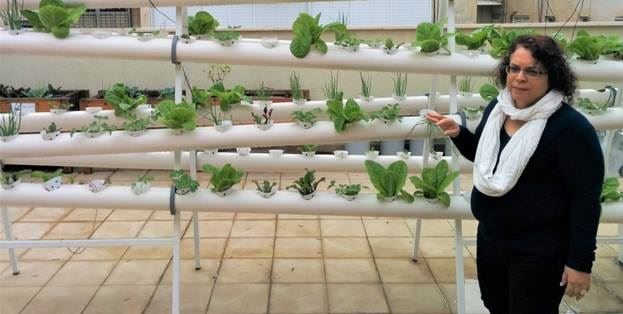“By focusing on an employment project that facilitates integration into the community, we help them build self-esteem and develop a sense of security,” says project manager Gila Nevo.
On a rooftop in the middle of a bustling Bat Yam neighborhood, a green oasis thrives, a vibrant hydroponic garden responsible for producing the highest quality natural soaps and oils in Israel. This meticulously maintained collection of herbs and spices is not cared for by the employees of a major Israeli cosmetics manufacturer. Rather, it is an innovative nature-based empowerment project developed to embolden and enrich the lives of people with psychiatric disabilities.
Run by Enosh, Israel’s Mental Health Association, in partnership with the Society for the Protection of Nature in Israel (SPNI), the project assists and accelerates the rehabilitation process for individuals with mental illness by allowing them to explore meaningful opportunities for self-development and experience the satisfaction of setting and achieving goals through participation in the entire production process of cosmetic soaps.
“The idea is to involve them from the very beginning of the process when the seeds are planted, show them how to make the plants grow and thrive, teach them new skills when it’s time to extract the oils for the production of the soaps, and even employ them in our on-site gift shop,” explained Gila Nevo, manager of Enosh’s Bat Yam community center.
“The individuals we assist have many hurdles to overcome, but by focusing on an employment project that facilitates their integration into the community, we are able to help them build self-esteem and develop a sense of security and belonging that leads to improved mental health.”
Because the roof garden is the project’s main work station, participants are forced to face their fears, which jumpstarts the healing process. For many, being up on roof, working with others, and using scissors, trowels and other sharp tools is incredibly stressful. But as they begin tending to the garden, nature becomes their “quiet room” – a natural, clean, uncomplicated and safe space – and their stress slowly melts away.
Lifting Stigma of Mental Illness
The garden has also helped lift the stigma of mental illness in this small corner of the world. While the residents of the surrounding apartment buildings were initially afraid of people with psychiatric disabilities, most of them are now heavily invested in the project, volunteering on a weekly basis.
“The community members that volunteer in the garden voice their enthusiasm regularly, letting us and others around the neighborhood know that maintaining the plants and bonding with the individuals in the Enosh program brings extreme happiness and satisfaction into their lives,” adds Nevo.
This comes as no surprise to Galia Hanoch-Roeh, director of the SPNI Tel-Aviv Urban Community, who has seen positive impact that community gardens have made throughout Israel.
“Community gardens are an incredibly versatile manifestation of sustainable urban-living that allows residents to grow their own fresh produce while spending quality time with others involved in a natural process. It’s the trifecta of social advancement, as it encourages nature appreciation and conservation, while breaking down social barriers and building communities,” said Hanoch-Roeh.
“By design, the homemade planters in Enosh’s garden contain multiple plant species, with each plant lending something else to its community. Some break down the soil, others provide shade, and yet others get rid of bugs. The message for the humans that tend to this and all other gardens is clear: the only way forward is together, without prejudice and with our eyes wide open to appreciate the unique contributions of each individual.”
While SPNI professionals provide the agricultural knowhow required to keep the garden thriving year-round and MIVNE, a commercial real estate company, and other prominent donors fund the project, the entire intricate vertical hydroponic irrigation system, as well as a small greenhouse, a composting system and a coy pond in the community center’s courtyard, were built by Enosh volunteers from all walks of life.
“Thanks to the Ministry of Health, the Municipality of Bat Yam, Israel’s National Insurance Institute, the Weinberg Foundation, MIVNE, and SPNI, we were able to create something magical on our rooftop. Anyone who visits the community center can see that our garden is about so much more than growing plants,” said Tamar Sadan Lachs, CEO of Enosh. “Our real triumph lies in our ability to be truly inclusive and change the way that Israeli society sees and treats people with disabilities, especially those with psychiatric disabilities.”
Breaking Down Social Barriers
There are over 500 community gardens in Israel, and SPNI professionally supports a large number of them, providing professional gardening assistance and working with local municipalities, governmental offices, and both public and private organizations to positively impact and bridge the gaps in communities across the country.
“Community gardens strengthen communities and improve quality of life, especially in underprivileged areas. But the rooftop garden at Enosh’s Bat Yam community center takes this phenomenon to the next level, breaking down societal barriers and cultivating a special kind of inclusion. We look forward to replicating this model in as many of the Enosh’s other locations across Israel as possible,” said Jay Shofet, the director of partnerships and development at SPNI, who has been singing the praises of community gardens for decades.
“And if the colorful and fragrant natural soaps in the Enosh gift shop, an embodiment of the sweet smell of success, are any indication, real societal change is well within our reach.”
By: Ayala Asher
